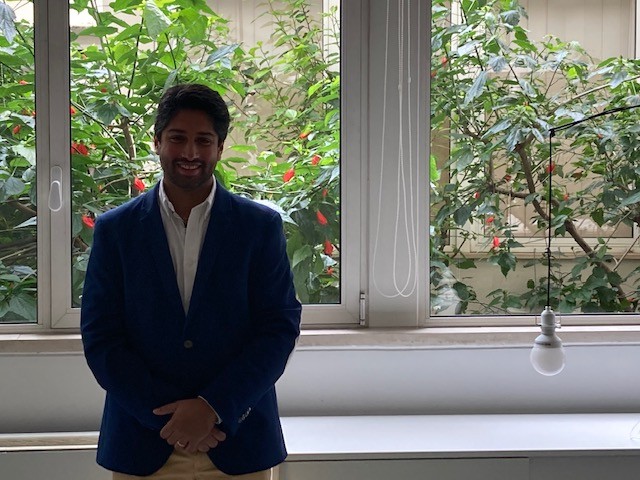
He does not speak much and he is discreet and reserved. I find him in his office at the Egas Moniz building. He wears a white shirt and pants in a camel tone. He has a hidden smile that is characteristic of those who think much more than what they say or express verbally. He appears to be calm as if he never seems to feel his own heart going into an arrhythmia, but it does, especially when he thinks of his three children at home who never seem to run out of energy. He answers family questions carefully with just a "yes" or "no", and, amidst genuine laughter, we realize that he could be a serious TV commentator who, on a television broadcast, sees his family entering the room shouting, with the baby-sitter in distress trying to keep them away. He lives well with the feeling that there is no perfection in any social role, especially that of a father, but he is introspective and, when confronted with time and its management, he is parsimonious in words.
Daniel Caldeira is a Cardiologist and Clinical Pharmacologist. He conducts research, teaches at the Faculty of Medicine and very recently joined the Ethics Committee team of the Lisbon Academic Medical Centre. He always believed that he would study Biomedical Engineering and he fulfilled that ambition. He explains that despite being a lazy teenager, the truth is that it was natural for him to be a good student, which caused a serious problem with his younger sister, the eternal term of comparison regarding goals and grades. He was accepted to study Biomedical Engineering and stayed there for a year. Then he realized that, after all, he wanted to outline a more strategic plan in terms of professional goals. He did not change to the Medical degree right away. He chose Dentistry. He experimented with two different realities and only in his third year in higher education, he understood that the degree that most suited him was Medicine. Despite having realized it earlier, he was stubborn about it and only accepted this vocation later on.
He did the Medical Degree basic cycle in Madeira and in year 3 he came to Lisbon, where he completed the degree. In year 4, he started to teach Disease Mechanisms (currently Pathophysiology), and, some time later, he started teaching Clinical Pharmacology and Therapeutics, as an Assistant, and later as an Assistant Professor.
Following completing 6 conventional years of training and choosing the Cardiology specialty, he went to Garcia de Orta Hospital. The link to the Faculty was always maintained through his classes in Clinical Pharmacology and Therapeutics. The completion of his specialty and of his Ph.D. took place almost at the same time. Not happy with his workload, he sat an examination to join the Doctors in Clinical Pharmacology Association, which turned him into a specialist in Cardiology and Clinical Pharmacology, all of this in 6 months and at the age of 33.
It is therefore not surprising when he says that the idea behind his Ph.D. was Medicine and Clinical Pharmacology, where he addressed aspects such as Pharmacoepidemiology, Safety and Pharmacoeconomics of oral anticoagulants. A theme that is still very present. Less than a month ago, FMUL assumed a position, in partnership with the Portuguese Society of Cardiology, in which it was argued that “direct oral anticoagulants (technically referred to as DOACs or NOACs) could be prescribed in a renewable prescription for patients with atrial fibrillation”. The article was written by him and can be accessed here.
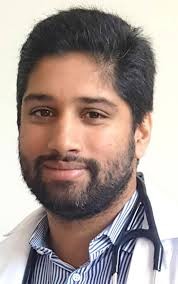
He describes himself as a “clinician of a specialty that has complementary means of diagnosis and that requires some clinical and pathophysiological reasoning”. He chose Cardiology because it is an area where technology is very advanced. It is also a specialty where there are many clinical trials, which constantly encourage new ones. As an area with a high mortality numbers, Cardiology also has many cases of efficacy and interventions, an ideal profile that fits his true skills.
As a researcher, he has published over 100 scientific articles. He likes to look for answers regarding everything that has not yet been clarified. He has always been like that, curious not about everything, just about “the juicy topics”.
How come that Cardiology, being one of the most technologically advanced areas, in Portugal continues to be one of the most deadly areas?
Daniel Caldeira: The first aspect is that cardiovascular risk factors are very prevalent, one of the first being age. As we extend longevity, risk factors have more time to act. But also high blood pressure, which is prevalent in 30% to 40% of adults, and diabetes, smoking and obesity are also very important aspects. But you know that although this is one of the main causes of death worldwide, there is a disinvestment in cardiovascular pathologies, if we compare them, for example, with oncological diseases. If we look at the world data, we realize that deaths due to cardiovascular issues are higher.
In your view, why is there a financial option that favours Oncological Diseases more?
Daniel Caldeira: There is a social burden associated with oncological diseases that brings a kind of guilt that people carry and that does not seem to exist in relation to cardiovascular diseases.
As if cancer was another collective social burden?
Daniel Caldeira: Yes! It is a social burden. I am a person of numbers and I cannot dissociate Oncology from Oncological Diseases. Think about this, people consider that a cancer prognosis is much more serious, but the truth is that a prognosis for coronary heart disease with severe heart failure also has a huge weight. And yet, the social weight given to each of these areas does not seem to be the same.
We are now in December and 9 months have passed since the pandemic began in Portugal. At the end of September, the news began to show signs that there would be an even more worrying wave than the first one. Increasingly tight and restrictive measures have caused hospitals to redo their own organization to receive Covid patients. Where are your Cardiology patients?
Daniel Caldeira: Cardiology patients who are now having their first consultations, those who have never had consultations in this specialty before, are being seen in person. The rest depends on the clinical situation, but we are providing telephone consultations and those who seem to need more care can and should come. But we are talking about a consultation period, because there are pathologies that appear abruptly and without warning for which patients have to be evaluated. Cardiac and neurological diseases, that is, cardio and cerebrovascular diseases, namely patients with myocardial infarction and stroke, for them there is always the emergency room. Failing to pay attention to these issues means we run the risk that these diseases have a greater impact than the pandemic itself.
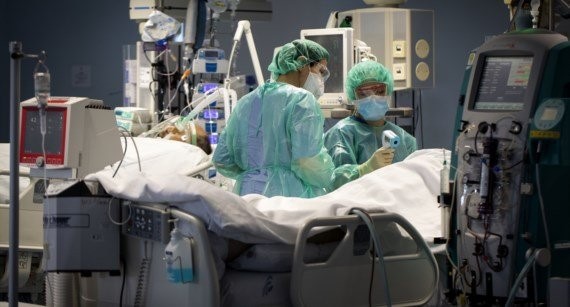
Can this inversion of care and priorities hierarchy happen in the short term?
Daniel Caldeira: If people do not use emergency services, if they are not informed, if there is no equity in health care, then there may be that risk. I recall that during the first lockdown we saw a substantial decrease in patients admitted for myocardial infarction, but the infarcts did not cease to take place.
So, the sick stopped coming due to fear, was that it?
Daniel Caldeira: Heart attacks did not cease to exist, so it is fear, yes. The interpretation of the information was perhaps not done properly, causing an excessive fear in relation to the pandemic and compared to some situations that people were experiencing, which under normal conditions would make the person go to an emergency service to be seen. This weight, due to the lack of knowledge, caused some people to become ill and not have been seen in a timely manner. We have had this here in Santa Maria.
We are talking about patients and that makes me ask an usual question. Can you separate the doctor's space from the private space and "not take the patient home"?
Daniel Caldeira: I can. That rule is established beforehand.
Are you always this rationally minded?
Daniel Caldeira: Only regarding a few things. The idea is to protect areas of personal life that are not affected by the role of being a doctor.
How is a newly trained doctor prepared to intervene with the patients? How do these people prepare for the real battle? How was it with you, how did you prepare yourself to know how to use what you have learned?
Daniel Caldeira: I think I was a little lucky because it is very linked to my path, since the early years I have had a lot of contact with clinical practice. Since year 1 I had a lot of contact with the patients and in year 3 (I don't know if I should say this), I missed some theoretical classes in order to go to the emergency room to check on patients. It is important to say that, until we move on to the most invasive techniques, there is a substantial leap, in which we only perform if there is a need for it and there is prior learning that is based on repeated observation, rehearsals. Putting it all in practice only comes later.
Tell me about going to the emergency room...
Daniel Caldeira: I thought it was the setting where I could absorb the knowledge that in other circumstances I would not be able to. This meant applying what we were learning in the most theoretical part of our academic training.
When do you realize that you enjoyed teaching others?
Daniel Caldeira: It was quite early. At the end of year 1, we have some teaching opportunities and one of the key subjects was Anatomy. I started with that experience and liked it. I liked it for several reasons. It helps us to remember our clinical practice and keeps us updated, the very transmission of knowledge makes us more attentive to ourselves. Then the interaction with students poses new questions, gives us new perspectives and forces us to study and not be stagnant. It makes us try to find the right way to transmit knowledge and then captivate those who listen to us, so that they get involved and interested.
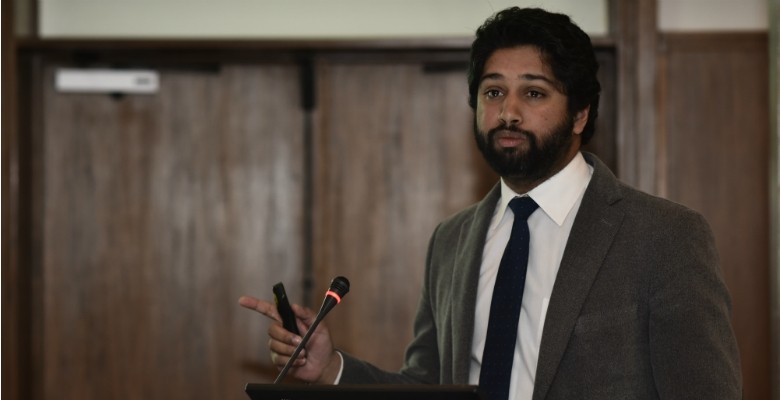
Will it make a difference for a group of young people, such as our students, to have a Lecturer closer to their age? Can a younger lecturer have a natural empathy with his students?
Daniel Caldeira: I have no doubt about that. As I have no doubt that in 10 or 20 years from now, young lecturers at that time will be able to communicate more empathically than I do. Time advances and changes us and I still feel a little bit the spirit of the medical student, I remember the doubts I had and the difficulties, I remember what I would have liked to have had and didn’t and I try to bridge some of those aspects. Of course, as time goes by, we lose track of the needs and wishes of these generations.
You have published dozens of papers. I would say that you are one of the youngest people with the largest number of publications. The research you conduct crosses two areas, Pharmacology and Cardiology. This is another one of your several areas of work...
Daniel Caldeira: One of the research instruments I worked on the most was systematic reviews with meta-analysis. My first review was published while I was still in year 6 in a peer-reviewed journal, which at the time made me very happy and made me want more. From there on, I started to publish. Together with people who supported me (younger and more experienced), and without wanting to be unfair to anyone, I have to mention 4 people who supported me a lot, Professors Joaquim Ferreira and Fausto J. Pinto (my Ph.D. supervisors) and Professor João Costa and Dr Cláudio David.
By mentioning those names, are you telling me that there are people who "inspire us" the most?
Daniel Caldeira: Yes, totally!
Do you also like to inspire others when you teach? Not out of ego, but to motivate others to break new ground.
Daniel Caldeira: No doubt about it! I think we should be critical and have that attitude, I like to pass this on, but also to be critical of myself.
Are you comfortable in this position of self-criticism?
Daniel Caldeira: Yes, because it forces me to reposition myself, to think about what I say, even in some actions when teaching.
And do you deal well with criticism?
Daniel Caldeira: When it is well-founded, yes. (Laughs) It can't be yes or no just because….
You also play an editorial role in scientific journals.
Daniel Caldeira: I play that role in Cochrane Heart and I was recently part of the editorial board of Revista Portuguesa da Diabetes. I had other editorial roles which, due to my schedule, I had to put aside.
How do you deal with death, sudden loss in an area like Cardiology, where the sudden moment happens so often?
Daniel Caldeira: (Long silence and fingers tapped on the table subtly, like a ticking clock) I try to assess if there was anything I could have done and didn't. Through my judgment of the situation, I try to learn.
Let me ask you about your family. How is it to manage the role of being the father of 3 very small children?
Daniel Caldeira: It's not easy. (Contains laughter but laughs with his eyes while repeating 5 times that "it is not easy"). I need a lot of help, both at home and here at work.
Perhaps it is important to demystify that there are no superheroes that can handle everything.
Daniel Caldeira: Absolutely! It's not possible. Unlike the initial phase of my career when I was the engine of the research, now my engine is also directed elsewhere and I cannot do everything. I think that at some point we know we have to delegate. At work I have people with whom I collaborate and who correspond to what I need.
Is being a father the most difficult role you have today?
Daniel Caldeira: (long silence) Yes ... Do you know why? Because it is difficult to integrate everything. (He doesn't answer anymore, remaining very silent, in the 4 questions that follow, he just says yes, the great difficulty is time, having time)
Did becoming a father change your perspective on human life?
Daniel Caldeira: Yes, it did. You gain more certainties, but also more fears. I now know very well what I want and what I don't want, and fear is because there is an extension of me that I do not control, and that makes us uncomfortable, but we learn to live with it.
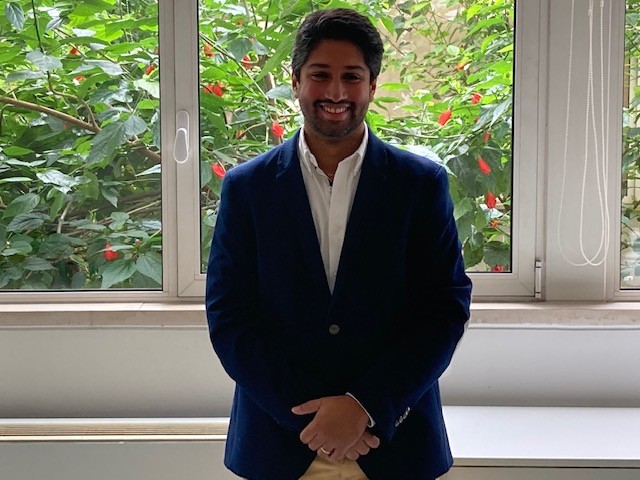
Despite a mathematical management of time without a second to waste, Daniel Caldeira did not fail to leave another door open for those who may one day follow his faultless role at the CAML, the Lisbon Academic Medical Centre. He expressed full openness to continue to supervise all those who want to do a Ph.D., just as others did with him.
Of those he has supervised and continues to follow, there are cases of successful publications in major scientific journals, a step that has already placed them on another level of demands, but also of new goals and opportunities.
Because the people who are most confident in their knowledge always want to be an extension to others, the same applies to this man who brings together the triangle of clinical, academic and research commitment in his life.
Joana Sousa
Editorial Team


